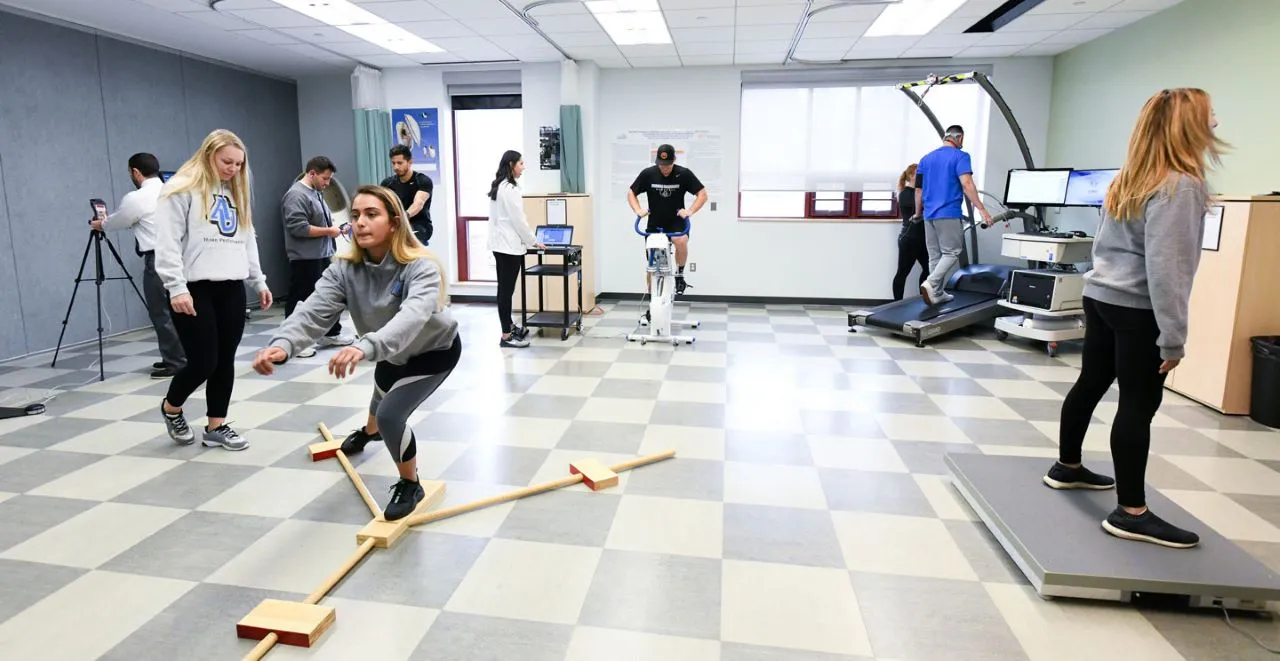Exercise Science Vs Exercise Physiology: What’S The Difference?
For those interested in a career related to exercise, nutrition, and sports performance, the fields of exercise science and exercise physiology can both be great options. But what exactly sets these two disciplines apart?
If you’re short on time, here’s a quick answer: Exercise science focuses on the broader interdisciplinary study of human movement and physical activity, while exercise physiology specifically examines the body’s response to exercise on a biological level.
In this comprehensive 3000 word guide, we’ll compare exercise science and exercise physiology in depth across factors like education requirements, job duties, salaries, and more to help you choose the right path.
Typical Degrees
Exercise Science Degrees
Exercise science degrees are academic programs that focus on the study of human movement, physical activity, and exercise. These degrees provide a broad understanding of the scientific principles behind exercise and its effects on the body.
Students pursuing a degree in exercise science typically take courses in anatomy, physiology, biomechanics, nutrition, and exercise prescription. They learn how to assess fitness levels, design exercise programs, and promote healthy lifestyles.
According to the American Society of Exercise Physiologists (ASEP), some popular exercise science degrees include:
- Bachelor of Science in Exercise Science
- Master of Science in Exercise Science
- Doctor of Philosophy (PhD) in Exercise Science
Graduates with exercise science degrees can pursue careers as fitness trainers, exercise physiologists, strength and conditioning specialists, wellness coaches, or pursue further education in related fields such as physical therapy or sports medicine.
Exercise Physiology Degrees
Exercise physiology degrees are more specialized programs that focus on the physiological and metabolic responses to exercise. These degrees delve deeper into the study of how the body adapts to physical activity, how exercise affects various systems of the body, and how to optimize performance and improve health outcomes.
Some common exercise physiology degrees include:
- Bachelor of Science in Exercise Physiology
- Master of Science in Exercise Physiology
- Doctor of Philosophy (PhD) in Exercise Physiology
Students pursuing a degree in exercise physiology typically take advanced courses in exercise physiology, exercise testing and prescription, research methods, and statistics. They also gain practical experience through laboratory work and internships.
Graduates with exercise physiology degrees often work in clinical settings, conducting exercise testing and rehabilitation programs for patients with chronic diseases or disabilities. They may also work in research or academic settings, studying the effects of exercise on various populations or developing exercise interventions for specific conditions.
For more information on exercise science and exercise physiology degrees, you can visit ASEP’s website for valuable resources and insights.
Day-to-Day Work Responsibilities
Exercise Science Work
Exercise science professionals are involved in a wide range of responsibilities related to physical activity and human movement. They may work in research, clinical settings, or fitness centers, focusing on studying the effects of exercise on the human body and developing exercise programs.
Some common day-to-day responsibilities of exercise science professionals include:
- Conducting research studies to investigate the impact of exercise on various health outcomes.
- Designing and implementing exercise programs for individuals or groups based on specific goals or needs.
- Evaluating and monitoring fitness levels, body composition, and physical performance of clients or research participants.
- Providing guidance and education on proper exercise techniques, injury prevention, and nutrition.
- Collaborating with other healthcare professionals, such as physical therapists or nutritionists, to develop comprehensive treatment plans.
Exercise science professionals play a crucial role in promoting physical activity and overall well-being through evidence-based practices and interventions.
Exercise Physiology Work
Exercise physiologists, on the other hand, primarily focus on the physiological responses and adaptations that occur during exercise. They work closely with individuals who have chronic diseases or conditions that can benefit from exercise.
Some typical day-to-day responsibilities of exercise physiologists include:
- Conducting fitness assessments and evaluations to determine baseline fitness levels and identify areas for improvement.
- Designing and implementing exercise programs tailored to the specific needs and limitations of individuals with chronic diseases or conditions.
- Monitoring and analyzing physiological responses to exercise, such as heart rate, blood pressure, oxygen consumption, and metabolic responses.
- Collaborating with healthcare professionals to develop exercise prescriptions that complement medical treatments.
- Educating individuals on the benefits of exercise and providing guidance on proper exercise techniques.
Exercise physiologists play a critical role in helping individuals with chronic diseases improve their overall health and quality of life through targeted exercise interventions.
For more information on exercise science and exercise physiology, you can visit the website of the American College of Sports Medicine (ACSM). They provide valuable resources and insights into the field, including the latest research and guidelines for exercise professionals.
Job Outlook and Salary Potential
Exercise Science Career Outlook and Salaries
Exercise science is a broad field that encompasses various career paths, including fitness trainers, wellness coaches, and exercise program coordinators. The job outlook for exercise science professionals is promising, with a projected growth rate of 13% from 2018 to 2028, according to the U.S. Bureau of Labor Statistics (BLS).
This growth is faster than the average for all occupations, indicating a high demand for professionals in this field.
In terms of salaries, the average annual wage for exercise science professionals is around $48,000, according to the BLS. However, it’s worth noting that salaries can vary depending on factors such as education, experience, and location.
Those with advanced degrees or certifications may have higher earning potential, especially if they work in specialized areas such as sports performance or clinical exercise physiology.
Furthermore, the demand for exercise science professionals is expected to increase as more emphasis is placed on preventive healthcare and the importance of regular physical activity. With the rise of chronic diseases related to sedentary lifestyles, there is a growing need for qualified individuals who can help people adopt healthier habits and improve their overall well-being.
Exercise Physiology Career Outlook and Salaries
Exercise physiology focuses on the body’s response to exercise and how it can be used to improve health and performance. Professionals in this field often work in clinical settings, such as hospitals or rehabilitation centers, where they assess and prescribe exercise programs for individuals with various medical conditions.
The career outlook for exercise physiologists is also promising, with a projected growth rate of 10% from 2018 to 2028, according to the BLS. This growth is faster than the average for all occupations, indicating a strong demand for professionals in this field.
In terms of salaries, exercise physiologists earn a median annual wage of around $49,000, according to the BLS. However, it’s important to note that salaries can vary depending on factors such as education, experience, and location.
Those who work in research or academic settings may have higher earning potential.
As the importance of exercise in disease prevention and management becomes more recognized, the demand for exercise physiologists is expected to grow. These professionals play a crucial role in helping individuals with chronic conditions, such as cardiovascular disease or diabetes, improve their quality of life through exercise prescription and monitoring.
Settings
Where Exercise Scientists Work
Exercise scientists work in a variety of settings, all of which focus on the study of exercise and its effects on the human body. One common setting for exercise scientists is research institutions and academic institutions such as universities or medical schools.
Here, they conduct experiments and studies to advance our understanding of exercise and its impact on health and performance. They may also work in government agencies or private research organizations, contributing to the development of exercise programs and policies.
Additionally, exercise scientists can be found in fitness and wellness centers, where they use their knowledge to design exercise programs tailored to individual needs and goals. Some exercise scientists also work in corporate settings, providing advice and guidance on employee wellness programs.
Where Exercise Physiologists Work
Exercise physiologists primarily work in clinical settings, focusing on the application of exercise to prevent and manage chronic diseases and conditions. They can be found in hospitals, rehabilitation centers, and outpatient clinics, working closely with patients who have specific health concerns.
Exercise physiologists assess patients’ physical fitness levels, design exercise programs, and monitor their progress to ensure safe and effective outcomes. They may also collaborate with other healthcare professionals, such as physicians and physical therapists, to develop comprehensive treatment plans.
In addition, exercise physiologists are employed by sports teams and athletic organizations, where they work with athletes to enhance performance and minimize the risk of injuries.
Key Differences in Skills and Abilities
While both exercise science and exercise physiology are closely related fields, there are some key differences in the skills and abilities required for each.
Exercise Science
Exercise science is a broad field that focuses on studying the effects of physical activity on the human body. Professionals in this field typically have a strong foundation in anatomy, physiology, and biomechanics.
They are knowledgeable about how the body responds and adapts to exercise, and they can apply this knowledge to help individuals improve their overall fitness and performance.
Exercise science professionals may work in a variety of settings, including fitness centers, sports performance facilities, and rehabilitation clinics. They may design exercise programs, conduct fitness assessments, and provide guidance on nutrition and lifestyle modifications.
Exercise Physiology
Exercise physiology is a more specialized field within exercise science. Professionals in this field typically have a deeper understanding of the physiological mechanisms that underlie exercise and physical activity.
They may have advanced knowledge in areas such as cardiovascular and respiratory physiology, exercise metabolism, and exercise prescription.
Exercise physiologists often work with individuals who have specific health conditions or performance goals. They may conduct advanced physiological assessments, design individualized exercise programs, and monitor clients’ responses to exercise.
They are trained to provide exercise recommendations that are tailored to each person’s unique needs and abilities.
Comparison
| Skills and Abilities | Exercise Science | Exercise Physiology |
|---|---|---|
| Anatomy and Physiology | ✓ | ✓✓ |
| Biomechanics | ✓ | ✓ |
| Exercise Prescription | ✓ | ✓✓ |
| Advanced Physiological Assessments | ✓✓ | |
| Individualized Exercise Programs | ✓✓ | |
| Health Conditions | ✓✓ | |
| Performance Goals | ✓✓ |
As you can see, exercise physiology requires a higher level of specialization and expertise in certain areas compared to exercise science. However, both fields play important roles in understanding and promoting the benefits of physical activity for overall health and well-being.
If you’re interested in learning more about exercise science and exercise physiology, you can visit websites such as American College of Sports Medicine or Exercise is Medicine for additional information and resources.
Conclusion
In summary, both exercise science and exercise physiology revolve around improving health, fitness and performance through exercise. But exercise science takes a broader approach focused on the biomechanics and sociocultural aspects, while exercise physiology concentrates specifically on the physiological effects.
Consider your own interests in research, coaching, rehabilitation or strength training when deciding between these rewarding and growing career paths in the exercise field.







